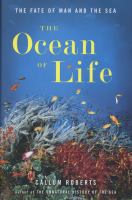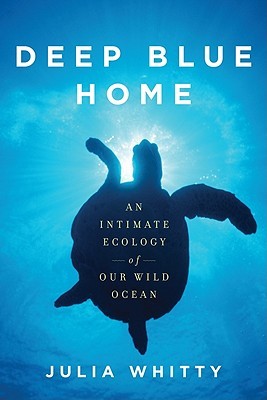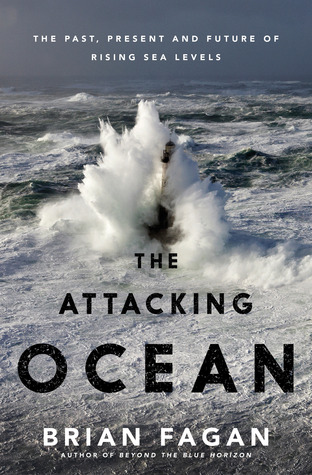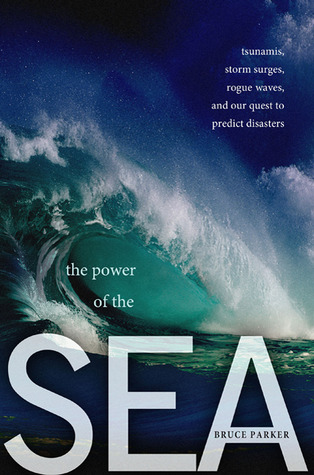 Now, I haven’t actually read The Ocean of Life by Callum Roberts, but it’s been on my (never-ending) to-read list and it relates to this week’s topic, so I’m going to let this be the introduction. Perhaps you’ll notice that I started off the series talking about all the wonders of the ocean and what it has to offer us, before coming around to talk about what we have wrought upon the ocean (and how we might be able to undo some of the damage we have caused). Perhaps you’ll notice that I mentioned earlier in the series, at the very beginning, how there seems to be a formulaic approach to writing books about marine life, and that I’m adhering to that formula 100%. But given that we’ve covered what lives in the ocean, I think it’s really only fair to talk about the ocean itself, because that mass of water is amazing in its own right. And frankly, it would be entirely remiss of me and the authors below to talk about the ocean without talking about the horrors we’ve inflicted upon it.
Now, I haven’t actually read The Ocean of Life by Callum Roberts, but it’s been on my (never-ending) to-read list and it relates to this week’s topic, so I’m going to let this be the introduction. Perhaps you’ll notice that I started off the series talking about all the wonders of the ocean and what it has to offer us, before coming around to talk about what we have wrought upon the ocean (and how we might be able to undo some of the damage we have caused). Perhaps you’ll notice that I mentioned earlier in the series, at the very beginning, how there seems to be a formulaic approach to writing books about marine life, and that I’m adhering to that formula 100%. But given that we’ve covered what lives in the ocean, I think it’s really only fair to talk about the ocean itself, because that mass of water is amazing in its own right. And frankly, it would be entirely remiss of me and the authors below to talk about the ocean without talking about the horrors we’ve inflicted upon it.
Roberts starts off with a history of the ocean and how people around the world have interacted with it and its inhabitants throughout the years, starting with how various cultures around the world have depended on molluscs and fish to varying degrees to supplement their diet. However, our relationship to the fish living within the ocean has changed dramatically, and this is painfully clear from a couple of graphs that appear in the first section, which illustrate, among other things, how people working in the fishing industry now have to put in about 17x more effort (as of The Ocean of Life publication in 2012) to catch the same amount of fish. This is despite – or perhaps precisely because of – improvements in fishing technology that allow us to find fish more easily and (in theory) catch more fish while expending less effort. Of course, trawling, which completely destroys delicate ecosystems and produces an underwater wasteland, is not the only factor in the decrease in marine life: chemical pollutants and waste such as plastic bags also play their part.
Doom and gloom constitute the first part of the book, so what follows in part 2 is, perhaps necessarily, the hope of recovering our oceans. The book ends, however, on a somewhat gloomy note, preparing for the downward slide that is the health of our ocean. How can we adapt to these changing conditions in the ocean, and what will become of both the ocean and us if we are to refuse to make an effort to bring about change?
The following books also discuss the ocean and how humans have affected it, but perhaps more importantly – or not, since I personally think it’s pretty important in and of itself rather than in its relation to people – how these changes to ocean chemistry have in turn come back to bite us. They are an ode to the ocean of life.
 With that said, I’m starting off with an exception to the rest of this post, and I’ll explain a little bit below.
With that said, I’m starting off with an exception to the rest of this post, and I’ll explain a little bit below.
What with a title like Deep Blue Home: An Intimate Ecology of Our Wild Ocean, you’d probably expect to be reading about the inhabitants of the watery depths that are the deep blue seas, right? Alas, if that’s what you’re picking this book up for, in the hopes of reading about Whitty’s adventures with and observations about (deep) sea inhabitants, you’re going to be rather disappointed, I think, and not because of the writing so much as because of the expectations the title generates. Or at the very least, you might not stick around long enough to get to Part Two of the book, which actually starts to turn from talking about the birds on Isla Rasa, where Whitty stayed with two female researchers for 100 days doing field work, to talking about doing work in the water. (This is my attempt to get you to continue reading till that point at least, because I was thrown way off when I started reading.)
In a way, though, Whitty is talking about the inhabitants of the ocean, because we often don’t think about the winged passersby and dwellers that call the deep blue their home when we think about the ocean, and yet they are just as reliant upon the ocean for their lives and well-being as their strictly (or mostly) aquatic counterparts that live within the depths of the waters. It is immediately apparent in how Whitty waxes poetic about her experience on Isla Rasa that she is in love with the seas and all the life it supports, and this passion certainly comes across in her writing. I personally prefer a different style of writing in general, but if you enjoyed Into Great Silence by Eva Saulitis (blogged here), or even perhaps Ice Diaries by Jean McNeil (blogged here), then you might be interested in picking up this slim book. They are very similar in terms of the biographical style, as well as, in my opinion, the mood this sort of reading best suits. The short chapters and what I see as somewhat tenuous, though interesting, connections are unexpected and a pleasant surprise, as they are presented as meditations upon Whitty’s experiences. Overall, this book is easy to dip into and out of, and I would recommend it to those who enjoy reading biographies.
Now, moving onto more doom and gloom!
 In The Attacking Ocean, Brian Fagan walks you through a history of the ocean in a few broad stages – from the past to the near present, from the near present to now, and from the present to beyond – describing the rising sea levels as well as our changed and changing relationship to it, both in terms of how we have contributed to a more rapid rise in sea levels as well as in how the rising sea levels have changed in terms of how they now affect us.
In The Attacking Ocean, Brian Fagan walks you through a history of the ocean in a few broad stages – from the past to the near present, from the near present to now, and from the present to beyond – describing the rising sea levels as well as our changed and changing relationship to it, both in terms of how we have contributed to a more rapid rise in sea levels as well as in how the rising sea levels have changed in terms of how they now affect us.
I found it quite useful (and amusing) that Fagan provided the reader with both a regular Table of Contents, which follows the chronological order of the book, as well as an Alternate Table of Contents, categorized by geography. If, for example, you’re really only interested in the history of rising ocean levels and how that has affected people living in Greenland, for example, that’s something you can look at without doing too much extra work just by referring to the Alternate Table of Contents. Handy.
The focus of The Attacking Ocean is on what the significance is of rising sea levels, and how it has affected people across the world historically, how it is affecting us now, and how it might/will affect us in the future. Rising sea levels aren’t just something to worry about if you happen to live by the shore or on a low-lying island, either (and while I’m not sure this is the underlying reason for the Toronto Islands flooding this year, it might strike a familiar note, this danger of losing ground). What may sound like miniscule rises affects the way severe storms and other events become ever more disastrous and dangerous to everyone living within their reaches. What might not have brought about quite as much destruction prior to rising sea levels now brings about much more damage to more people than ever before, in part because of the rise in our population and where those populations have sprouted.
The Attacking Ocean is a sobering look at the effects of rising sea levels, and Fagan does not offer much in terms of an easy solution: there is no easy solution, and the longer we leave the problem alone, the fewer options will be available to those of us still alive when there is no longer any space to move inland once disaster strikes, if simply because there are too many people. Fagan covers a lot of ground in terms of what will be affected by the rise in sea levels, and it’s a fascinating read!
Complement The Attacking Ocean with The Power of the Sea, below.
Bruce Parker focuses more specifically on the natural disasters that arise of the sea, and the ways in which we try to predict them in The Power of the Sea, starting from the crudest weather and wave predictions to our current state of knowledge regarding the sea. What’s particularly of interest to me is that our ability to predict the ocean did not advance much for much of history, until the advent of supercomputers that could finally take the load of information and process it in order to render it into something coherent. The Power of the Sea is peppered throughout with anecdotes of famous historical figures, such as Napolean Bonaparte and Alexander the Great, or even Kublai Khan, and how they were almost (or actually) thwarted by nature.*
Parker goes through different sea-related phenomena such as the tsunamis, storm surges, and rogue waves on the cover, and explains along the way the history of how people have tried to predict these phenomena, as well as what the now known causes of them are. It can get a bit technical, but I think Parker does a pretty good job trying not to inundate the reader with information. The historical anecdotes spread throughout the entire book help ground what Parker is talking about in each instance and make apparent the dire consequences of being unable to (or neglecting to) predict the caprices of the sea.
It’s really amazing how even as we become more and more able to predict natural disasters with the advent of supercomputers that are able, finally, to process the sheer amount of information needed to develop a finer understanding of hydrodynamics, it becomes more and more difficult to minimize their destructive effects because of the way the population has grown, and the ways in which civilization has spread. It reminds me of the way fishing gear has “upgraded” to enhance efficiency (though more damage is being done than ever before to the ecosystems with this enhanced efficiency, so in the long run, methods like trawling are destroying the resource), and yet the fishing industry still catches about the same amount of fish (because the seas have been depleted from overfishing, among other issues, besides which fish are becoming smaller and smaller for the same reasons). The weather phenomena themselves have also become increasingly worse and more frequent due to the rising sea levels (as Fagan talks about above).
*Parker also briefly discusses how Moses parting the Red Sea might have been an astute tactical manoeuvre on Moses’ part, utilizing his knowledge of the tides to disorient the Pharaoh and his men when the tide came rushing back. There’s also a part that talks about how, although the entire world was likely never flooded, the world as people knew it might have appeared to be flooded (the horizon line becoming shrouded with water) in parts of the world. Parker doesn’t talk in detail about whether those parts of the world with flooding myths correspond exactly with those areas that experience this phenomenon, but he does talk about what might have the grain of truth behind these myths. If you’re interested in reading about the flood (though I’m not sure if this one focuses more on speculation as to what might have caused the flood or details what information there is to be found about the flood): The Ark Before Noah by Irving Finkel.
Perhaps this is somewhat of a gloomy note to end a series on, but I think the turn from wonder to the reality of the danger posed to what gives us wonder should only be fair. Without introducing you to the wonders of the seas and what lives within them, perhaps the destructive nature of the sea being compounded by human indiscretion would not be quite as sobering. Though the focus of these books above is not quite on the animals living within the oceans, they are of course affected just as much, if not more, than we are – and it’s clear that we experience more of the consequences that come of rising sea levels, to which we contribute, than we might at first think, so just think of what those living within its waters must be going through!
As a bit of an aside: you might have noticed by now that it almost appears as though authors (and I) are using the words “ocean” and “sea” interchangeably. And speaking for myself, I am, for the most part. As for the authors of these books, I think they are also, more or less. However, if you want to get really technical, there is a difference between the two. And the fun thing here is that if you look at dictionary definitions, it certainly doesn’t really sound like there is much of a difference, and this is because dictionaries base their definitions on how people use the words**. It also depends on which dictionary you look at. Merriam-Webster has “ocean” being one of the senses (or subsense? I didn’t make notes, so I’m afraid I have forgotten what it’s called, exactly) of the first definition of “sea”, whereas Oxford, though it also has “sea” for “ocean” in 1.1, says that this is a North American thing. On the whole, it looks like seas are smaller than oceans, and a quick search reveals they might have a different relationship to land than the ocean does? And “ocean” refers also to The Ocean covering the Earth, not just the different oceans. I’d love to hear from someone who knows the difference between the two, in clear terms!
And this brings us to the end of the Dive Into Reading series! I hope you’ve enjoyed reading my impressions and reviews of some of the many books we carry around the subject, ranging from ocean critters to the ocean itself to just plain water to weather to the history of humanity… it kind of sounds like I’m recommending you read through the entire library at this rate (which I am, but don’t be afraid!), but I’m sure by now you see how everything comes back around full circle.
If you’d like to peruse the other installments of the series, here is a full list of the posts:

I haven’t had a chance to read Brian Fagan’s “The Attacking Ocean” yet, but I have read other books by him. His book “Beyond the Blue Horizon” is quite interesting and explores early seafarers.
That sounds fascinating! It’s kind of amazing just thinking about how someone might look out at the open ocean and think, “I’m pretty sure I can survive out there on some contraption I’ll engineer out of wood” (though I’m sure there was a bit more planning involved than that in reality… or so I’d hope). I’d love to read that sometime!
Yes – they were awe-inspiring achievements made possible by the skills these early sailors and navigators had learned.